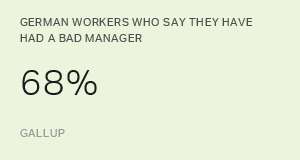It's a trick question: Gender doesn't matter, talent does.
About a third of all German workers would prefer to work for a male boss. Sexist? Sure. But gender doesn't dictate good people management skills, talent does. And German companies rarely recognize managerial talent in men or women.
All employees feel the impact of a good manager's ability to meet their needs and expectations -- or of a bad manager's incompetence. Almost half of all German workers, however, would prefer to choose a boss on the basis of gender.
That preference is biased, no question. But before rushing to judgment about sexism in Germany, recognize that very few German managers can be assessed on ability at all. That's because in Germany, good people management gets short shrift.
Gender Bias at Work
Most German workers (52%) say that their manager's gender doesn't make a difference to them, but of those who have a preference, many more would prefer a male (34%) to a female (14%) boss. And it isn't just men harboring that sentiment: While women are more likely than men to say that they prefer a female boss (18% vs. 10%), they are still most likely to say they would rather work for a man (40%) as are their male coworkers (30%).
However, we did not find a statistical difference in engagement between people with female managers (23% engaged) and those with male managers (18% engaged), showing that men and women do an equally poor job as managers. Nonetheless, those who work for women are more likely than those with male bosses to say that they would prefer a female boss (29% vs. 9%).
Evidently, gender prejudice can evaporate on contact with managerial talent. Good. But there's a catch: The talent to manage people is so undervalued that German workers may never see a talented female manager. Or a male one, for that matter.
How Not to Pick a Manager
In Germany, great managers are an exception, as shown by our most recent State of the Global Workplace report: Between 2014 and 2016, only 15% of workers were engaged at work (and 15% were actively disengaged) on average, with only one-fifth strongly agreeing that their performance is managed in a way that motivates them to do outstanding work. When they're asked if they had thought about leaving their current company due to their direct supervisor, significantly fewer engaged employees (3%) than actively disengaged employees (45%) answer "yes." Sixty-nine percent reported that they had at least one bad manager in their career. And 18% of actively disengaged employees are currently looking for a new job, as are only 1% of engaged employees. (Not entirely coincidentally, 97% of managers consider themselves to be a "good manager.") Meanwhile, actively disengaged employees cost Germany between 80 billion and 105 billion euros annually in lost productivity.
These facts cannot be blamed on managers or businesses. Management culture is at fault. Management education, particularly the MBA, focuses on financial and administrative processes and pays scant attention to the people who make those finances and processes work. That one-sided focus does not promote employee engagement. Moreover, many companies move employees into management whether or not they have an aptitude for managing people. When Gallup asked German managers why they believed they were hired for that role, 51% cited their experience and tenure in their company or field and 47% said it was due to success in a previous non-managerial role.
The Importance of Engagement
Experience, tenure and previous success are not the same as managerial talent. Experience and skills are important, but talent -- the naturally recurring patterns in which we think, feel and behave -- predicts performance. Companies need to select managers based on their talent to engage, care for and focus on each employee as an individual. Managers who consistently fail to engage their employees should be removed.
Selecting managers with the right talent to engage and manage employees is a leadership responsibility.
Company leaders should hire and promote for managerial talent, then help managers develop their management abilities and reward those with people management skills. No matter how talented managers are, they still need support, training and coaching, and they must be held accountable -- and rewarded (!) -- for their teams' engagement.
Managers need to be engaged as well, and too few are. Gallup data show that managers have roughly the same engagement level as employees without managerial responsibilities (21% vs. 19%). It's a lot easier for leaders to cultivate engagement across a company when managers have the right talent for the job -- and when managers are themselves engaged. In fact, managers who are supervised by highly engaged exec teams are 39% more likely to be engaged than those supervised by disengaged exec teams. And front-line employees who are supervised by highly engaged managers are 59% more likely to be engaged than those supervised by disengaged managers.
Time for a Change
Changing the culture of management may seem like a tall order for leadership, but it has been done before and done well. German workplaces that focus on engagement have achieved a rate of 3.6 engaged employees to every one actively disengaged worker, compared with Germany's overall ratio of 1-to-1. So it is possible to foster an engaging workplace culture in Germany -- and doing so gives organizations a competitive advantage.
That advantage could benefit women, too. Women are as likely as men to be talented managers, but for now talent isn't valued the way that it should be -- and neither are women, apparently. A more realistic view of managerial talent would benefit women as well as men ... and workers and companies, too. As noted, employees feel the impact of a good manager's ability and a bad manager's incompetence. Gender doesn't dictate that impact. Only talent does.
Learn more about how Gallup can help your organization discover and develop great managerial talent:
- Offer our Leading High-Performance Teams course to your managers to ensure they have the right strategies and tools for engaging employees.
- Download our free State of the American Manager report to discover what America's best managers do differently.
- Inquire about our analytics-based hiring solutions for identifying and selecting those with managerial talent.
Jennifer Robison contributed to the writing of this article.



